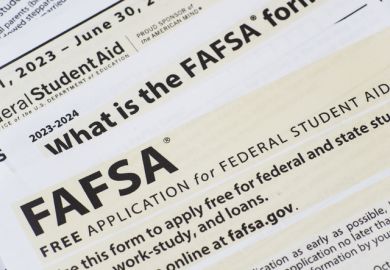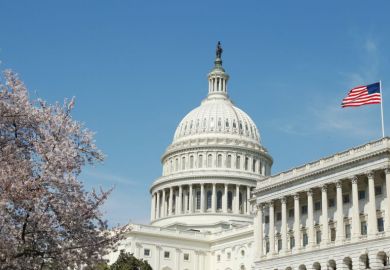Changes to student aid applications have caused delays and short-term pain for US colleges, but will benefit students in the long term, according to experts.
The Free Application for Federal Student Aid (Fafsa), used by millions of applicants each year to apply for financial aid, experienced a number of issues with its rollout last year.
Laura Perna, professor of education at the University of Pennsylvania, said the delays caused “confusion and real challenges”, with the effects being seen in this year’s enrolment intake.
Falling admissions among first-time undergraduate enrolment at four-year public institutions are seen as indicating that it has caused problems for students from lower-income families.
“It may take more time for us really to know exactly how this played out, but it certainly has been worrisome, especially in the context of other forces, like questions about the value of higher education, concerns about costs and debt and things like that,” said Professor Perna.
The form allows applicants to see the difference between the “sticker price and the net price” and understand exactly how much a college education will cost, she added.
“It’s really unfortunate that it’s just been such a rocky road for students and for institutions too,” said Professor Perna, who is also executive director of the Alliance for Higher Education and Democracy (Ahead).
“The colleges and universities that are really working to try to assist students through this important process have experienced a lot of challenges because of these delays.
“People who work in financial aid offices are there because they are interested in trying to help students pay the cost of going to college, and to have this delay and then the implications of that…has been very challenging.”
Robert Kelchen, professor of education at the University of Tennessee-Knoxville, said a “substantial cohort” of students seemed to have missed out this year as a result of the delays.
“Historically, if students delay enrolment, at least a share of them will never end up going,” he said. “So I think there will be students who either never go to college as a result of this or decide to go maybe years later.”
He said the Department of Education was not ready to launch the form when it did, and ignored the warnings from those within the financial aid community.
“[Colleges] are absolutely livid about what’s happened in the past year because they had to process all of the financial aid offers in a very short period of time and there really weren’t ways for them to fix errors and mistakes except doing it one by one,” added Professor Kelchen.
The Fafsa form for the next admissions cycle has also been delayed from 1 October to 1 December.
However, Professor Kelchen said that the changes – which allow the Fafsa form to handle much more complicated family situations – will help disadvantaged students.
“The question is, are the long-term gains ever going to make up for what happened for this cohort and also the reputation of the Fafsa, which already was not great among the general public?” he asked.
“But my outstanding question is, will this scare students away from going to college in the future even when the form will end up being better going forward?”
Professor Perna warned that any further delays might contribute to the “overall confusion and the lack of confidence in the system”, but said the modifications would make things much simpler for students.
Those working in colleges must encourage students to complete the Fafsa and to persist “despite the challenges”, she added.
Register to continue
Why register?
- Registration is free and only takes a moment
- Once registered, you can read 3 articles a month
- Sign up for our newsletter
Subscribe
Or subscribe for unlimited access to:
- Unlimited access to news, views, insights & reviews
- Digital editions
- Digital access to THE’s university and college rankings analysis
Already registered or a current subscriber? Login








